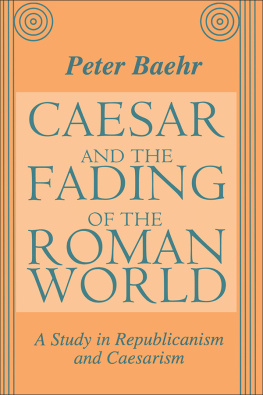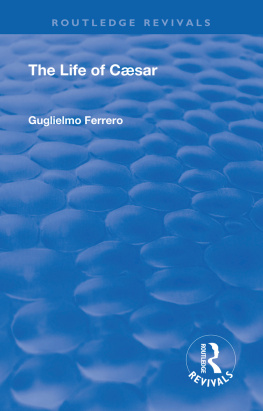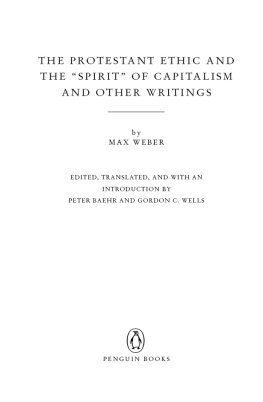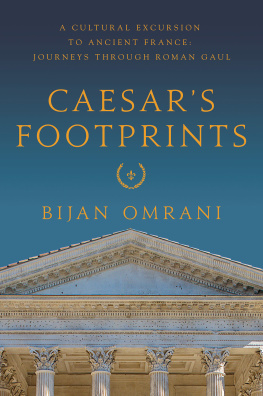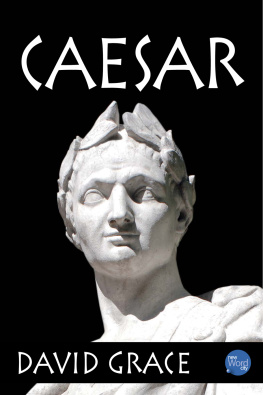First published 1998 by Transaction Publishers
Published 2017 by Routledge
2 Park Square, Milton Park, Abingdon, Oxon OX14 4RN
711 Third Avenue, New York, NY 10017
Routledge is an imprint of the Taylor and Francis Group, an informa business
Copyright 1998 by Taylor & Francis
All rights reserved. No part of this book may be reprinted or reproduced or utilised in any form or by any electronic, mechanical, or other means, now known or hereafter invented, including photocopying and recording, or in any information storage or retrieval system, without permission in writing from the publishers.
Notice:
Product or corporate names may be trademarks or registered trademarks, and are used only for identification and explanation without intent to infringe.
Library of Congress Cataloging-in-Publication Data
Library of Congress Catalog Number: 97-16701
Baehr, P. R. (Peter R.)
Caesr and the fading of the Roman world : a study in Republicanism and Caesarism / Peter Baehr.
p. cm.
Includes bibliographical references and index.
ISBN 1-56000-304-9 (cloth)
1. Political scienceHistory. 2. CasearismHistory
3. RepublicanismHistory. I. Title.
JA81.B243 1997
321.9dc21
97-16701
CIP
ISBN 13: 978-1-56000-304-5 (hbk)
I first became interested in Caesarism some years ago when I was pursuing doctoral work at the University of Leicester on Max Weber. In the summer of 1994, I decided to return to some of the questions this work had originally provoked, but which, innocent as I then was of the republican tradition, I had been unable to answer. I would never have made this trip back to earlier concerns without the resolution of Irving Louis Horowitz. I am particularly grateful to him for encouraging me to revise earlier ideas and giving me the opportunity to present the results to a wider audience. Moreover, though this book bears little resemblance, in either argument or structure, to my doctoral thesis I must thank my supervisor Clive Ashworth for his initial guidance and great intellectual generosity.
Second, I am keen to acknowledge the individuals who read parts of the manuscript, proffered other kinds of advice on its content, or whose linguistic skills I often had need to call on: Charlene Agar, David Beetham, Jeff Bursey, James Butrica, Hilary Campbell, Kathleen Buckley, Anne Furlong, Rita Kindl, Helen Morgan, Barbara Neis, Marina Orsini, Thomas Pustow, John Selby, John Scott (University of Essex), Peter Sinclair, Duleepa Wijayawardhana, but especially Volker Meja, and Gordon C. Wells. Hedda Schuurman has been a particularly important interlocutor for me over the last couple of years, while to a continuing dialogue with Volker Meja I owe many insights and clarifications. I am also indebted to Geoffrey de Ste. Croix for the time and trouble he took to clarify a number of issues of Roman history, to Adrian Tronson for his astute comments on those parts of the text I asked him to read, and to Stuart Pierson who endured the onerous task of reading the manuscript in its entirety. His remarks helped improve the book in countless ways. Errors of judgment and of fact that remain are obviously my own responsibility.
Financial backing was provided by Memorial University under a program that allowed me to hire for a short but productive period two talented students, Yit Kay Moong and Martha Goosney, as research associates. I gratefully acknowledge their help as I do the support of Judi Smith and Annette Carter, the secretaries of the Department of Sociology, and that of the university more generally.
At the heart of a book on society and culture lies a paradox that will be familiar to all who have attempted to write one. While the subject matter of ones work is social relations, the activity actually demanded by the writing process itself normally requires long stretches of peace and quiet, asocial if not often plain antisocial behavior. It follows that my most keenly felt obligations are to the three peopleCaesare clementiores who have supported me in this enterprise: Hedda Schuurman, my mother Anne Baehr, and especially Hilary Campbell who lived with this work during its embryonic and most exasperating stages. The book is dedicated to her with love and gratitude.
St. Johns, Newfoundland, June 10, 1996
The Soothsayers Vindication
There is a moment in the early political career of Julius Caesar that has become famous to historians of ancient Rome. Trudging the rounds of the assize circuit in Spain, Caesar came across a statue of Alexander the Great in the town of Gades. According to Suetonius, the thirty-two-year-old Caesar was overheard to sigh impatiently, vexed, it seems, that at an age when Alexander had already conquered the whole world, he himself had done nothing in the least epoch-making. Moreover, when on the following night, much to his dismay, he had a dream of raping his own mother, the soothsayers greatly encouraged him by their interpretation of it: namely, that he was destined to conquer the earth, our Universal Mother (Suetonius 1.7 = 1980:15).
Suetonius story may, of course, be apocryphal; even if true, its chronology has often been disputed by historians. What is beyond doubt is that the soothsayers prediction was insufficiently bold. For Julius Caesar not only went on to conquer the earth; his reputation then proceeded, for almost two millennia, to impose itself on the imagination of the Western world.
To document Caesars notoriety is a secondary, if nonetheless prominent, objective of the present study. Its main purpose is to examine the trajectory and outcome of a particular European debate bound up with Caesars name: the Caesarist debate of the second half of the nineteenth century. During this period, controversy in European educated circles turned around Caesarism, a novel political formation exemplified in the regimes of Napoleon III and, to a lesser degree, Bismarck. The debate about Caesarisma term coined in the late 1840s, popularised in the 1850s, and a key word till the end of the centuryis best distinguished, however, from a much longer argument about what one might call the Caesar-question.
For many centuries before the nineteenth, Caesar was a name that evoked strong feelings among educated people. Some of these responses were laudatory, as in those interpretations that imagined Caesars monarchy to be a preparation for the Kingdom of God. Of particular relevance to this book, however, is one discourse and traditionpolitical republicanismthat envisaged Caesar as an historical symbol for some of the most dangerous tendencies a polity could experience. The term republicanism is a slippery one, and is not to be confused with the American political party of the same name. But as a first approximation we can define it as a political idiom that received its most potent and influential (post-Roman) expression in the Florentine Renaissanceits locus classicus is Machiavellis Discourses-was thereafter appropriated by the English republicans or Commonwealthmen of the seventeenth century (for instance by Henry Neville, John Milton, and James Harrington), was then adapted by Montesquieu and Rousseau in the eighteenth, and, in a plurality of mediations, became an integral element in the discourse of the American revolutionaries and constitution-builders, and of their counterparts in France.


